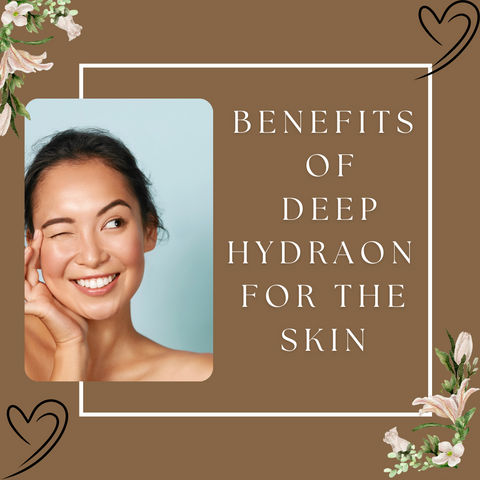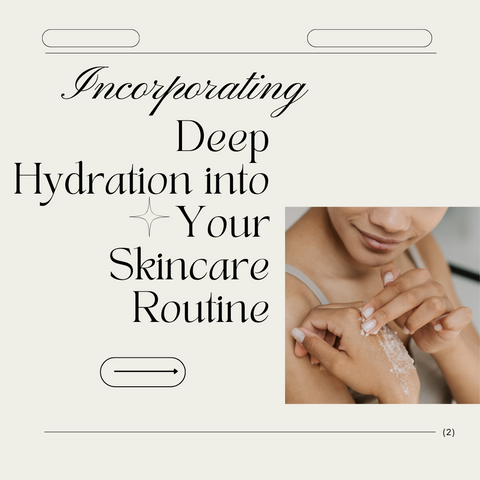Deep hydration is essential for skin health because it improves moisture levels, supports skin barrier function, and promotes overall skin well-being. This blog delves deeper into the science of deep hydration and its impact on skin health.
Exploring the Fundamentals of Deep Hydration

Understanding the fundamentals of deep hydration is critical for skin health maintenance. Here's a look at the essentials, including skin barrier function, hydrating ingredients, humectants, emollients, and occlusives, natural moisturising factors (nmfs), skin types and hydration, external factors influencing hydration, hydration, and ageing, hydration practises, a well-balanced skincare routine, and healthy lifestyle factors.
What is Deep Hydration and Why is it Essential?
Deep hydration refers to the process of replenishing and maintaining moisture levels within the skin at a deeper level, reaching beyond the surface layers. It involves delivering moisture to the skin's deeper layers, ensuring long-lasting hydration, and supporting overall skin health.
The Importance of Deep Hydration:
-
Enhanced Moisture Retention: Deep hydration aids the skin's ability to retain moisture, preventing dehydration and dryness.
-
Improved Skin Barrier Function: Proper hydration strengthens the skin's natural barrier, preventing moisture loss and protecting against environmental stressors.
-
Optimal Skin Health: Well-hydrated skin appears more supple, plump, and youthful. It minimises the appearance of fine lines, wrinkles, and dullness.
-
Balanced Skin: Deep hydration balances oil production, even in oily or combination skin types, reducing the likelihood of excess sebum production.
-
Faster Healing and Repair: Adequate moisture supports the skin's natural repair processes, aiding in quicker healing from damage or irritation.
-
Prevention of Skin Issues: Deeply hydrated skin is less prone to irritation, flakiness, and sensitivity, reducing the risk of skin conditions like eczema or dermatitis.
Key Ingredients for Achieving Deep Hydration
Several important ingredients are well-known for their ability to deeply hydrate the skin through moisture attraction and retention. Hyaluronic acid (ha), glycerin, ceramides, aloe vera, sodium PCA, squalane, panthenol (provitamin b5), sodium hyaluronate, urea, and shea butter are some important elements commonly found in skincare products for obtaining deep hydration. Incorporating these elements into your skincare routine can provide effective deep hydration and maintain a hydrated, healthy complexion.
Differences Between Surface and Deep Skin Hydration
Moisture levels within different layers of skin are referred to as surface and deep skin hydration. Understanding their differences aids in effectively addressing specific skincare needs:
Surface Skin Hydration:
-
The epidermis is the skin's outermost layer.
-
Surface hydration refers to the retention of moisture in the skin's outermost layers, primarily the stratum corneum.
-
Moisturisers and hydrating products primarily impact the surface, providing immediate relief and hydration to the top layers of the skin.
-
Addresses the skin's superficial dryness, flakiness, and roughness while providing a temporary hydrating effect.
-
Humectants (e.g., glycerin) and emollients (e.g., shea butter) help lock moisture into the outer layer of the skin, improving texture and appearance.
Deep Skin Hydration:
-
The skin's deeper layers beneath the epidermis are called the dermis and subcutaneous tissue.
-
The skin's structural elements receive long-lasting hydration and support from deep hydration that reaches the dermis and even deeper layers.
-
Hydrating agents with smaller molecular structures penetrate deeply, locking in moisture and supporting collagen and elastin for long-term benefits.
-
Supports skin elasticity, firmness, and overall skin health by keeping the deeper layers hydrated.
-
Hyaluronic acid, ceramides, and certain peptides penetrate deeply, plumping the skin and aiding in skin renewal.
Importance of Both:
-
Combining surface hydration to address immediate moisture needs with deep hydration to support long-term skin health is critical for overall skin balance.
-
Surface and deep hydration both contribute to a healthy skin barrier, preventing moisture loss and protecting against environmental damage.
Benefits of Deep Hydration for the Skin

Deep hydration has various skin health benefits, including improved moisture retention, skin barrier integrity, and overall skin wellness. Deep hydration has several advantages, including improved moisture retention, strengthened skin barrier function, improved skin texture and appearance, reduced symptoms of ageing, faster healing and recovery, support for skin health, and long-term benefits. Incorporating profoundly hydrating products and practises into your skincare routine can result in healthier, more radiant-looking skin.
Improving Skin Elasticity and Texture
Improving skin elasticity and texture entails a variety of skincare practises and products that help to support the structure, firmness, and overall appearance of the skin. Use retinol-rich products, incorporate peptides, hydrate and moisturise regularly, apply sunscreen daily, consider antioxidants, adopt a healthy lifestyle, facial massage and exercise, chemical peels and exfoliation, hyaluronic acid fillers, and medical treatments, and consult a dermatologist or esthetician. Combining these practises into your skincare routine can help enhance the elasticity, texture, and overall appearance of your skin over time. Consistency and patience are essential for attaining visible outcomes.
How Deep Hydration Prevents Aging Signs
Deep hydration helps to avoid visible indications of ageing by preserving skin health, strengthening the skin barrier, and treating a variety of ageing causes. The following signs of ageing can be avoided with deep hydration:
-
Improved Moisture Retention: Adequate hydration plumps up the skin, making fine lines and wrinkles less visible. Well-hydrated skin is less prone to dryness, which can accentuate the signs of ageing.
-
Enhanced Skin Elasticity: Hydrated skin retains elasticity, which reduces sagging and promotes a more youthful appearance. Deep hydration can help collagen synthesis, improving skin strength and resilience.
-
Protection Against Environmental Damage: A well-hydrated skin barrier defends against environmental stressors such as UV rays, pollution, and free radicals, reducing their harmful effects. Reducing environmental damage helps to prevent premature ageing symptoms like sunspots, pigmentation, and loss of elasticity.
-
Maintenance of Skin Health: Hydrated skin promotes smoother, more radiant skin by facilitating better cell turnover. Deep hydration helps prevent skin issues like dry patches, flakiness, and irritation.
-
Minimization of Wrinkle Formation: Deep hydration has a plumping effect, filling in lines and preventing the formation of deeper wrinkles. Adequate hydration keeps the skin from becoming thin and crepey, resulting in a more youthful appearance.
-
Support for Natural Repair Processes: Hydrated skin promotes the skin's natural repair mechanisms, resulting in faster healing from external factors or skin conditions.
-
Retaining Skin Volume and Fullness: Proper hydration helps retain skin volume, preventing the hollow or sunken appearance associated with ageing.
Enhancing the Skin's Natural Barrier
Improving the skin's natural barrier is critical for skin health, moisture retention, and protection from external irritants. Gentle cleansers, hydrating and moisturising, avoiding harsh ingredients, sun protection, limiting hot water exposure, incorporating barrier-repairing ingredients, avoiding over-exfoliation, humidifiers, dietary factors, and patience and consistency are all effective ways to improve and support the skin barrier. Gentle skincare practises, moisturising products, and barrier-supporting chemicals all contribute to a robust and healthy skin barrier, resulting in a radiant and well-protected complexion.
Incorporating Deep Hydration into Your Skincare Routine

Incorporating deep hydration into your skincare routine entails employing products and practises that deeply moisturise the skin and maintain healthy moisture levels. Here's a step-by-step strategy to efficiently integrating deep hydration:
-
Gentle Cleansing: Use a gentle, hydrating cleanser to remove impurities without stripping the skin of its natural oils.
-
Hydrating Toners or Essences: After cleansing, use hydrating toners or essences containing humectants like hyaluronic acid to boost skin hydration.
-
Targeted Serums or Ampoules: To deeply moisturise and support the skin barrier, apply a hydrating serum containing ingredients such as hyaluronic acid, ceramides, or peptides.
-
Moisturise: Use a moisturiser that is appropriate for your skin type and concerns. For maximum hydration, look for products containing hyaluronic acid, glycerin, or ceramides.
-
Hydrating Masks: Use hydrating masks or overnight masks once or twice a week to add moisture to your skin.
-
Eye Cream: Use an eye cream designed specifically to hydrate the delicate skin around the eyes, combating dryness and fine lines.
-
Sun Protection: Use a broad-spectrum sunscreen with an SPF of 30 or higher to protect the skin from UV damage while also keeping it hydrated.
Additional Tips:
-
Hydrating Mist: Use a hydrating facial mist throughout the day to add moisture.
-
Humidifier: Use a humidifier in dry environments to keep the air moist, which benefits your skin.
Choosing the Right Products for Maximum Hydration
Choosing the best solutions for optimal hydration entails looking for formulations that contain certain substances that are known for their moisturising effects. Here's a guide to help you choose the best products:
-
Hydrating Cleanser: To cleanse without sacrificing moisture, look for gentle, non-stripping cleansers containing moisturising ingredients such as glycerin, hyaluronic acid, or ceramides.
-
Hydrating Toners or Essences: Opt for toners or essences containing hydrating agents like hyaluronic acid or glycerin to prep the skin for better product absorption.
-
Hydrating Serums or Ampoules: Choose serums or ampoules formulated with high concentrations of hydrating ingredients such as hyaluronic acid, vitamin B5 (panthenol), or peptides for deeper moisturization.
-
Moisturizers: To lock in moisture and reinforce the skin barrier, look for moisturisers that contain humectants (such as hyaluronic acid or glycerin), occlusives (such as petrolatum or shea butter), and emollients (such as squalane or ceramides). Choose a texture (gel, lotion, or cream) that is appropriate for your skin type. Choose richer creams for dry skin, whereas lighter gels or lotions for oily skin.
-
Hydrating Masks: Consider using hydration masks, sleeping masks, or sheet masks enriched with hyaluronic acid, aloe vera, or other hydrating agents once or twice a week for an extra moisture boost.
-
Eye Creams: Select eye creams with hydrating ingredients like hyaluronic acid, ceramides, or peptides to moisturize the delicate skin around the eyes and minimize dryness.
-
Sunscreen: To protect and moisturise the skin at the same time, choose a broad-spectrum sunscreen with extra moisturising components such as hyaluronic acid or glycerin.
To achieve optimal hydration, choose skincare products that have hydrating elements that are appropriate for your skin type and issues. When selecting products to keep your skin moisturised and healthy, consider your skin's needs, texture preferences, and any sensitivity.
Tips for Layering Hydrating Skincare Products
The right layering of hydrated skincare products provides optimal absorption and efficacy. Here are some pointers on how to layer moisturising products successfully in your skincare routine:
-
Begin with Clean Skin: Start with a clean face to ensure maximum absorption of subsequent products. Use a gentle cleanser suited to your skin type.
-
Layer in Consistency Order: For better absorption, apply products from thinnest to thickest consistency. Lighter textures are more easily absorbed by the skin.
-
Apply Hydrating Toners or Essences First: To prepare the skin and improve absorption of subsequent products, apply toners or essences containing hydrating ingredients such as hyaluronic acid or glycerin.
-
Apply Serums or Ampoules Next: To address specific skin concerns, use moisturising serums or ampoules containing active ingredients such as hyaluronic acid, peptides, or vitamins.
-
Moisturiser: To lock in hydration and support the skin barrier, apply a moisturiser containing hydrating agents such as ceramides, squalane, or hyaluronic acid.
-
Incorporate Eye Cream: Use an eye cream with hydrating ingredients designed for the sensitive skin around the eyes. Pat it gently to avoid tugging.
-
Finish with Sunscreen (Daytime): Finish your morning routine with a hydrating sunscreen to protect your skin from UV damage while maintaining moisture.
Addressing Different Skin Types and Needs
Different skin types have unique hydration needs and require specific approaches to maintain optimal moisture levels. Here's a breakdown of how to address various skin types:
1. Dry Skin:
-
Needs: Deep and continuous hydration, nourishment, and protection against moisture loss.
-
Approach: To avoid removing natural oils, use creamy, rich cleansers without harsh surfactants. Incorporate moisturising serums or ampoules containing substances such as hyaluronic acid or ceramides. To lock in moisture and relieve dryness, use stronger, emollient-based moisturisers. To prevent water loss, consider occlusive substances like as shea butter or petrolatum.
2. Oily Skin:
-
Needs: Hydration without clogging pores, balancing sebum production, and maintaining a matte appearance.
-
Approach: Select mild, non-comedogenic cleansers to get rid of extra oil without making the skin dry. To avoid too much shine, use oil-free moisturisers or light, water-based hydrating serums. Hyaluronic acid is one hydrating ingredient you can use to add moisture without feeling heavy. Think about moisturisers with gel bases, which provide moisture without clogging the skin with more oil.
3. Combination Skin:
-
Needs: Balancing hydration levels between oily and dry areas of the face.
-
Approach: Use a gentle cleanser that treats both oily and dry skin without over-drying. To supply moisture without worsening oiliness, use lightweight hydrating serums. Consider applying different moisturisers on different regions of your skin (lighter on oily spots, richer on drier patches). Hyaluronic acid-containing products can help both dry and oily skin by delivering balanced hydration.
4. Sensitive Skin:
-
Needs: Gentle hydration, soothing ingredients, and minimal irritation.
-
Approach: To avoid provoking sensitivity, use fragrance-free, hypoallergenic cleansers. Choose mild, moisturising toners or essences with calming components such as aloe vera or chamomile. To avoid irritation, choose moisturisers with few chemicals and light moisturising agents. Avoid aggressive exfoliants and active chemicals that may aggravate irritation.
5. Normal/Combination Skin:
-
Needs: Maintaining balanced hydration levels without causing excess oiliness or dryness.
-
Approach: Use a gentle cleanser that is good for both oily and dry skin. As needed, apply moisturising serums with a mix of lightweight and somewhat richer formulations. Consider applying a medium-weight moisturiser that hydrates without becoming thick or greasy. Adjust products based on specific areas—as needed, modify products to drier or oilier zones.
Advanced Insights and Trends in Deep Hydration

Deep hydration insights and trends in skincare frequently incorporate unique formulations, advanced technologies, and emerging practises. Advanced hydrating ingredients, encapsulation technology, moisture-boosting actives, customizable skincare, hydration monitoring devices, sustainable hydration, barrier repair and hydration, combination treatments, a holistic approach, and skin microbiome research are some of the advanced insights and emerging trends in deep hydration. Trends are shifting towards personalised, effective, and long-term hydration solutions that address individual skin demands while taking into account environmental impact and overall skin health.
Latest Innovations in Hydrating Skincare
Here are some of the most recent innovations in the field:
-
Hydration that is beneficial to the microbiome: Products that help the skin's microbiome maintain a healthy balance for better hydration and overall skin health.
-
High-Tech Delivery Systems: Advanced delivery technologies encapsulate active substances, allowing for greater penetration and sustained release, hence improving hydration benefits.
-
Waterless or Low-Water Formulas: Skincare products that contain little or no water in order to reduce environmental impact and improve potency.
-
Sustainable Ingredients and Packaging: Increased emphasis on acquiring environmentally aware, plant-derived substances that improve hydration. Packaging material innovations that are recyclable, biodegradable, or manufactured from post-consumer recycled materials.
-
Personalised Skincare Solutions: Technological advancements provide personalised skincare based on individual hydration needs, lifestyle factors, and skin issues.
-
Next-level Hydrators: Polyglutamic Acid (PGA) is gaining popularity as a superior humectant, holding more moisture than hyaluronic acid and providing a plumping effect. Formulations containing various molecular weights of hyaluronic acid for multi-layered hydration.
-
Skin Barrier Support: Products that hydrate while also reinforcing the skin barrier, preventing moisture loss, and improving overall skin health.
-
Smart Skincare Devices: Emerging devices that analyse and monitor skin hydration levels, and guide users in tailoring their skincare routines effectively.
-
Hybrid Hydration Treatments: Formulations that combine hydrating components with active ingredients such as retinoids, peptides, or antioxidants for enhanced benefits.
The skincare industry is always evolving, offering cutting-edge technologies, environmentally friendly practises, and novel ingredients to revolutionise moisturising skincare. Advances strive to provide more effective, personalised, and ecologically conscious solutions that respond to individual hydration demands while also supporting overall skin health.
Natural vs. Synthetic Hydration Methods
Natural and synthetic approaches to hydrating the skin can be broadly classified, each with its own set of benefits and considerations:
Natural Hydration Methods:
-
Botanical extracts and ingredients derived from plants: Many natural ingredients, such as aloe vera, botanical hyaluronic acid, and plant oils, provide hydration benefits without the use of synthetic additives. Some plant extracts have soothing, antioxidant, and anti-inflammatory properties that benefit skin health.
-
Humectants from Natural Sources: Humectants are ingredients such as glycerin, honey, or aloe vera that attract moisture to the skin without the use of synthetic chemicals. They can hydrate while being gentle and suitable for sensitive skin.
-
Oils and Butters: Natural oils like jojoba, argan, and shea butter can provide deep hydration and nourishment without the use of synthetic additives. These oils contain fatty acids that can aid in the maintenance of the skin's barrier and the prevention of moisture loss.
Synthetic Hydration Methods:
-
Lab-Created Hyaluronic Acid and Active Ingredients: Synthetic hyaluronic acid and other lab-created humectants may have standardised molecular weights for targeted penetration and hydration advantages. They can be created at specified concentrations, increasing the effectiveness of certain skincare products.
-
Technological Innovations: Encapsulation and other advanced technologies enable the development of delivery systems that improve the efficacy and stability of hydrating substances. These approaches can deliver active hydration components in a more controlled and sustained manner.
-
Customised Formulations: Synthetic chemicals can be precisely formulated and blended to produce bespoke skincare remedies for specific skin issues. They are frequently subjected to rigorous testing and quality control to assure their stability and efficacy.
Considerations:
-
Effectiveness and potency: Synthetic ingredients may have more standardised effects due to controlled formulations, whereas natural ingredients can vary in potency.
-
Sustainability and ethics: Natural ingredients may be more environmentally friendly, but some synthetic methods can be developed in a sustainable manner.
-
Skin Sensitivity: While natural ingredients are less likely to irritate sensitive skin, synthetics can also be formulated to be gentle.
Both natural and synthetic methods of skin hydration are beneficial. Individual preferences, skin sensitivities, sustainability concerns, and desired skincare effects frequently influence the choice between the two. Many skincare products combine natural and synthetic components to maximise the advantages of each. Consultation with a dermatologist or skincare specialist can assist in determining the best hydration strategies for specific skin needs and preferences.
Expert Advice: Dermatologists' Recommendations for Deep Hydration
Dermatologists stress the significance of maintaining skin moisture through gentle washing, hydrating product selection, continuous moisturization, and sun protection. Seeking professional counsel aids in the development of a skincare programme that addresses individual moisture needs while boosting overall skin health.
































